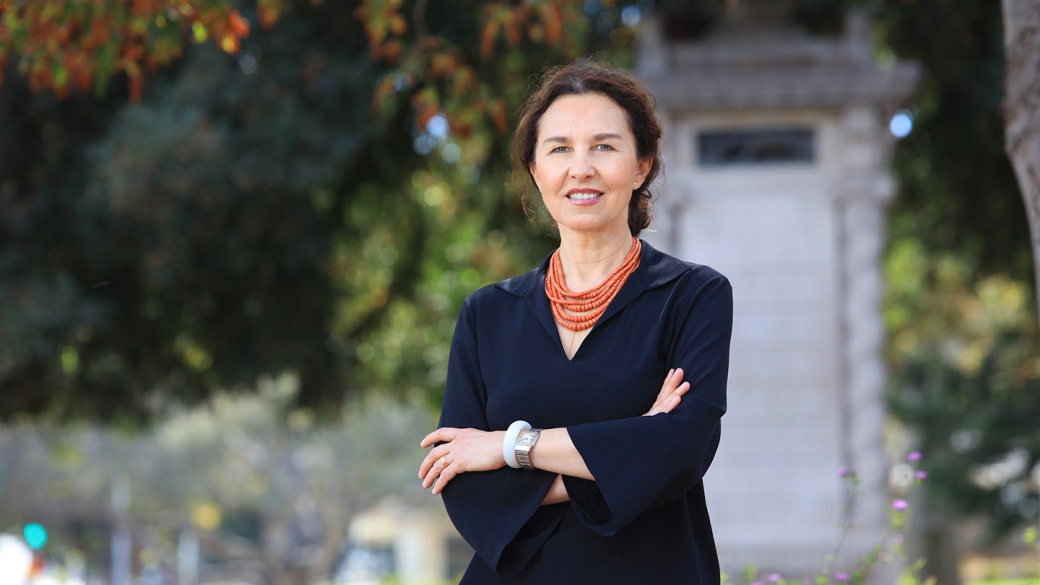A Conversation with Anna Vassilieva
| by Eva Gudbergsdottir

Anna Vassilieva is a Middlebury Institute professor, director of the Russian Studies Program, and founder and director of the Graduate Initiative in Russian Studies. Her areas of research include contemporary Russian politics, Russian politics in Central Asia, Russian culture and society, Siberia, and Russians in Japan.
Q: Growing up in eastern Siberia, one of the most geographically isolated and deprived regions of the world, must have come with some challenges. Can you share with us what that experience was like? And what the impetus was for you to leave Russia for the United States when you did?
A: My parents, who are geophysicists, chose to leave their native Leningrad for work in Siberia, an area with abundant mineral resources. Russian poet Joseph Brodsky wrote a poem with words that are very relevant to both my lives—in Siberian Irkutsk and in Monterey: “If you happened to be born in an Empire, it is better to live in province by the sea / far enough from Caesar, far enough from snowstorms, one doesn’t have to be afraid, to kowtow, to rush.”
I consider my childhood to be a very happy one, as I grew up with loving parents, went to an excellent school, and had all the books and music I wanted. Things looked different when I began to learn about the challenges of living in a totalitarian system. The predominant group think, the enforced uniformity of opinions, the fear of doing things that are not prescribed or approved, the all-permeating communist ideology and propaganda were particularly difficult to swallow.
The shock of learning about the horrible truths of Stalin’s purges and other atrocities that occurred during the seven decades of Communist rule was such, that despite the promises and the euphoria brought in with Gorbachev’s reforms, I was glad to receive an invitation from what was then the Monterey Institute of International Studies to teach a course on Siberia and the Russian Pacific in the fall of 1989. When I left for good, I felt a deep relief because I was leaving behind this gigantic country with such a tormented, bloody history and the collective psyche that I knew would take a long time to straighten and heal. And I knew that my sons would have opportunities that the Soviet Union at that time would not be able to provide.
How much does an average American know about life in contemporary Russia, about the phenomenal changes that have occurred in that country in the last 25 years? There is very little knowledge, because it is so rare that Americans can read about “normal” life in Russia in the mainstream media.
Q: Western media and public discourse about Russia in recent years has in large part been connected to the image and actions of Vladimir Putin. What are we missing when the focus is so narrow?
A: Let me use the now-famous Kissinger quote that gives a perfect diagnosis of the situation: “For the West, the demonization of Putin is not a policy; it is an alibi for the absence of one.” How did we arrive to the situation when one of the most important countries in the world is being viewed through the prism of our emotional attitude to one person, Vladimir Putin? No one has taken away Russia’s size and its strategic location, its human and mineral resources, its nuclear arsenal, its pride and the strength of its people when it comes to defense of their values and history.
Yet how much does an average American know about life in contemporary Russia, about the phenomenal changes that have occurred in that country in the last 25 years? There is very little knowledge, because it is so rare that Americans can read about “normal” life in Russia in the mainstream media. Yet everyone gets a heavy dose of Putin’s assumed “crimes,” all narrated in very strong language and demeaning, offensive rhetoric. Russophobia has deep roots in the U.S., and Russia bashing has become a darling of liberals and conservatives in this country. All of that would be quite appropriate if modern Russia were the Soviet Union; it is not. It is a very different country now, and the majority of Russians see Putin as the leader who returned to them and their country the sense of worthiness and the reasons for them to be proud of being Russians.
Q: What role, if any, can education play in stabilizing the bilateral relations?
A: The underlying truth of it all, I sup- pose, is that the United States does not have a long-term strategy vis-à-vis Russia. We do not have a joint plan for combating terrorism; we do not have a plan of joint actions regarding the forthcoming challenges of global warming; we do not have intentions of bringing our youths closer to each other for the purpose of cementing personal friendships and cultivating better understanding between our two countries. From 1900–1954, the accumulated demographic losses of Russia amounted to 76 million people as a result of the two World Wars, the revolution, purges, and other cataclysms. Seventy-six million people! And that does not include millions of unnecessary deaths in Russia. (The country was losing a million people a year due to the political and economic changes of the 1990s.) So now let’s think, why would people who accumulated such a tremendous collective psychological trauma not welcome stability? It is important for us to understand that mindset changes happen gradually. Russia’s youth is our biggest hope. This is why the United States needs a real strategy regarding Russia, a strategy that would allow future generations of Americans and Russians to live in peace and harmony.
For More Information
Eva Gudbergsdottir
evag@middlebury.edu
831-647-6606
Jason Warburg
jwarburg@middlebury.edu
831-647-3516
